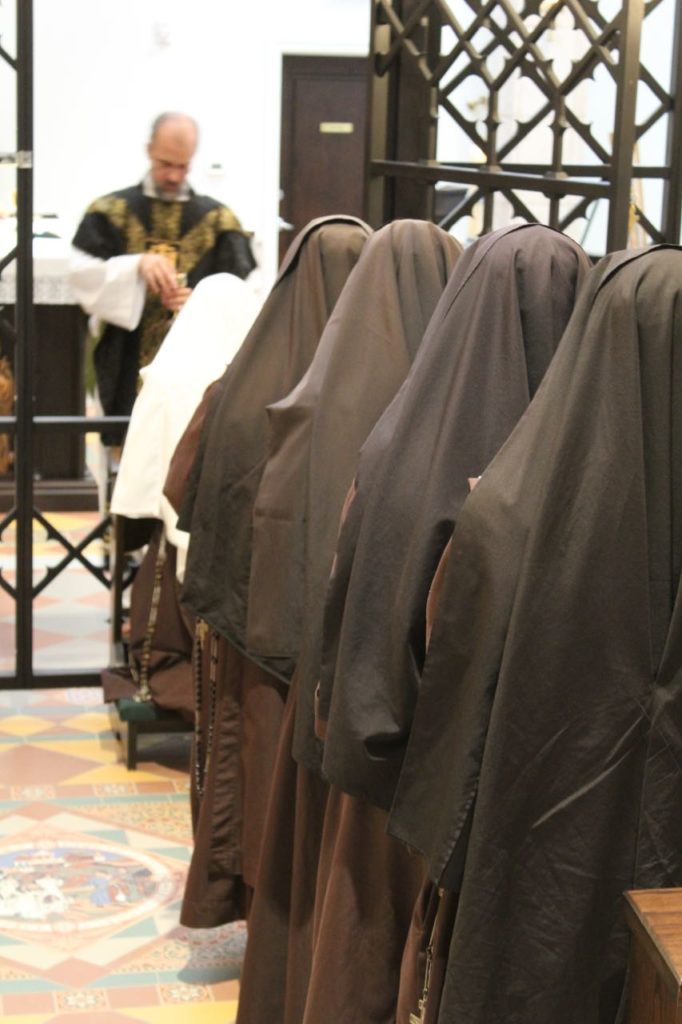We are adorers of the Most Blessed Sacrament and the purpose of our adoration is thanksgiving.

Essentially, we begin to do on earth what every blessed soul will do for all eternity: praise, adore, and offer thanksgiving to our God. Our life is one of total dedication to perpetual adoration of Our Lord Jesus Christ, Truly Present in the Most Blessed Sacrament, in a spirit of reparative thanksgiving.
What is reparative thanksgiving? Reparative thanksgiving can be defined as offering Our Lord our gratitude His Love and Grace in place of those who never thank Him; it is to love Him for those who have no time for Him. It is to “make thanksgiving our dominant thought…in taking upon ourselves, with the Savior and through Him, reparation for ingratitudes, and in becoming victims of thanksgiving…” (from the Early Constitutions).
Adoration of the Most Blessed Sacrament is our fulfillment. To be His spouses and adorers is our identity and our joy. Our vocation can be summed up in one single word: ADORATION. Our vocation is the embracing of ‘the one thing necessary.’
Our life and the life of every contemplative Religious is to be lived in the Heart of the Church…intimately united in a profound solidarity with the Church and Her saving mission. Our cloistered life affords us the opportunity to “supply the ammunition of prayer” to all those priests, missionaries, and active Order Religious throughout the entire world who are stationed on the “front lines.” Mother Marie of St. Clare described this aspect of our vocation in the following way: “To devote ourselves to Jesus in the Eucharist, to the Church, to the interests of the glory of God, to the extension of the Kingdom of Our Lord, these are our duties. And do not say that, because of our humility, it is too great a vocation. As adoring souls, we must lead all souls to Jesus, but principally the souls of Priests. In our holy Constitutions, in effect, we are told that we must not be content with our own sanctification, but we must make it our business to pray for the missionaries. All those who have the care of souls should be the object of our supplication. To reach sinners, holy Priests are needed; to direct chosen souls, holy Priests are needed; and for us too, for the fervor of our little Community, holy Priests are needed. Finally, who will give us Jesus in the Sacrament of Love if not the Priest?” It is precisely in this life of hidden prayer that the contemplative is a missionary – consumed with a burning desire for the salvation AND sanctification of souls. In this way “the little world of our enclosure” opens up to vast horizons of hope!
Our Holy Father, Pope John Paul II, sums up the meaning of our vocation so well: “A monastery is a true ‘powerhouse’ of spiritual energy that is nourished at the source of contemplation, after the example of prayer to which Jesus devoted Himself in solitude, immersing Himself totally in dialogue with God the Father, to draw the necessary strength for His saving mission. The Church prolongs Christ’s mission in time: among the many charisms which enrich Her, She also cherishes the very precious one of the contemplative life, cultivated in monasteries, as a response to the absolute love of God Who in the Incarnate Word united Himself to humanity in an eternal and unbreakable bond. Monasteries of women express the exclusive union of the Church with Christ Her Bridegroom with particular eloquence, reliving the experience of Mary, the Virgin of silence and listening.” It is this silence and listening spirit that we hope to cultivate in our hidden life of prayer and sacrifice.
Bishop Thomas J. Olmsted and the people in the Diocese of Phoenix welcomed us with open arms and have made us feel so welcome. Being the first contemplative Order in the Diocese, we take our responsibility very seriously to pray and sacrifice for the Church, and in particular for the Church in the Diocese of Phoenix.
To learn more about our charism, check out these links:
The Catholic World Report’s interview of Mother Marie Andre
Dumb Ox’s Heart of Living Podcast featuring Sr. Mary Fidelis

